Using Data and Evidence to Inform School Reopening in Ghana
By Cynthia Bosumtwi-Sam and Sarah Kabay
Ghana closed its schools on March 15, 2020, as part of the country’s lockdown to address the COVID-19 pandemic. When schools reopen, they cannot simply resume business as usual. Though the Ghanaian education system and education systems around the world are facing significant challenges, research and evidence can offer some guidance on how to address them. In this blog, we use insights from IPA’s recent RECOVR survey and the TCAI and STARS research projects to provide a few suggestions for how to approach reopening schools in Ghana.
1. Meet children where they are
Even before schools were closed due to COVID-19, children in the same grade were at different learning levels. The TCAI study in Ghana found that the variation in learning levels within a classroom was two times greater than the average difference in learning levels between grades.
The recent school closures might increase this variation in children’s learning levels. In IPA’s RECOVR survey, conducted in May 2020, we found that many children were not spending any time on education, and for children who were spending time on education, the amount of time they were spending varied significantly. Among the respondents to our survey, the time children spent on education was not related to the income- or education-level of their household.
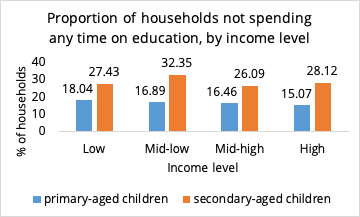
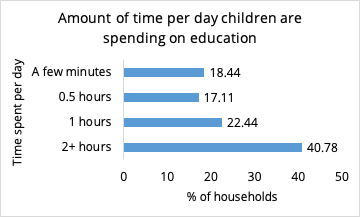
When children return to school, they will be at different learning levels. Schools and educators must first assess children in order to determine what skills they have and what level of instruction will be most useful for them, and then aim to provide them with that level of instruction.
Ghana has experience using this approach in two research projects in primary education: TCAI and STARS, which were co-created in partnership with the Ministry of Education, Ghana Education Service, and Innovations for Poverty Action. Resources from these projects, such as manuals and teacher's guides, are already available and can be used to support teachers as they focus on the fundamental skills that are most important to children’s learning.
2. Directly engage parents and teachers
In IPA’s RECOVR survey, survey respondents identified a lack of supervision from adults in the household as the most common reason why children weren’t spending more time on education.
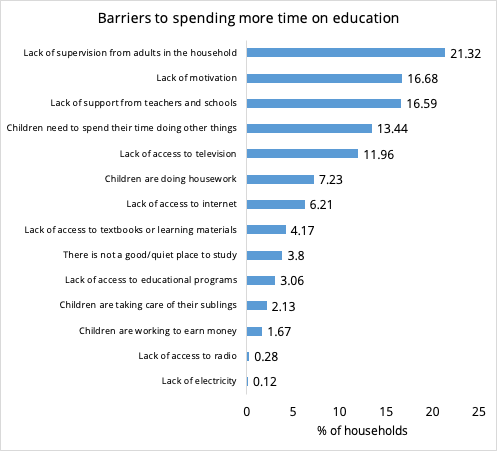
Qualitative research in Ghana has found that parents and teachers do not always agree on their roles and teachers often feel frustrated in their attempts to communicate with parents. With all of the challenges facing school reopening, it will be important for parents and teachers to work together.
In general, it will be important to coordinate and align different stakeholders in the school reopening process. It was difficult during the school closures to define and clearly communicate the role of teachers. As a result, not all teachers were sure of their role.
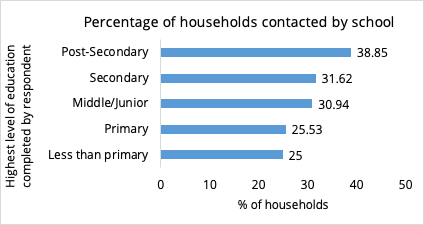
In IPA’s RECOVR survey we found that just under one third (32%) of households reported being contacted by their school in the period since schools had closed. Households with higher levels of education were more likely to be contacted, potentially indicating that children living in households with higher levels of education are going to better schools or that teachers are more likely to contact parents with higher levels of education.
Moving forward, it will be important to clearly define roles for parents and teachers, to communicate these roles to all parents and teachers, and to find ways to support a positive relationship between parents and teachers.
3. Support the home learning environment
Even when schools are fully operational, research has shown that children still only spend between 10 and 20% of their waking hours in school. In addition, the quality of the home learning environment is widely recognized as a key factor supporting young children’s early literacy and numeracy skills.
In IPA’s RECOVR survey, we found that most children were using their own books or books provided by the school to spend time on education. Recent research in Kenya found that distributing books and training parents in dialogic reading practices improved children’s early literacy skills, and that impacts were largest for the children of illiterate parents.
Research in Côte d'Ivoire and Brazil has found that engaging parents in children’s education using SMS messages can improve learning even while schools are in session. And IPA has just started a similar study in Ghana.
Continuing with effective distance learning and home learning initiatives even once schools reopen can be part of the effort to not return to business as usual after the pandemic. Simply reopening schools does not mean children will automatically learn. Continuing to support the home learning environment is one way to commit to children’s learning.
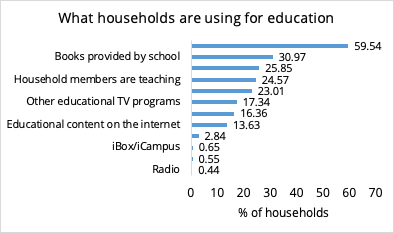
Cynthia Bosumtwi-Sam is a Policy Advisor at IPA Ghana.











